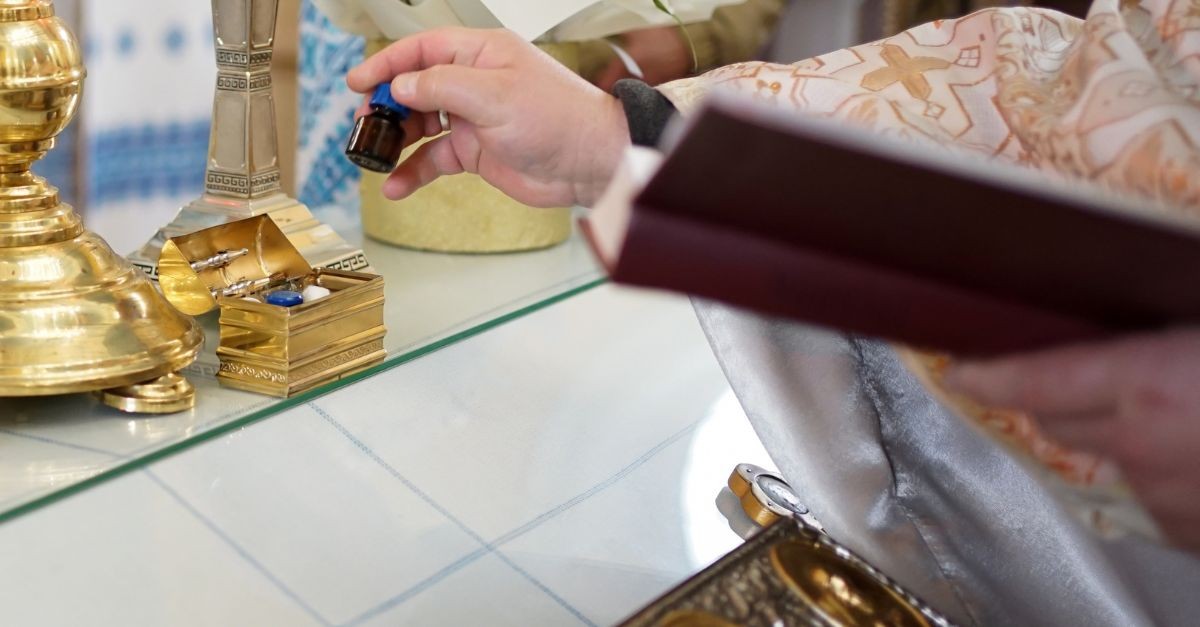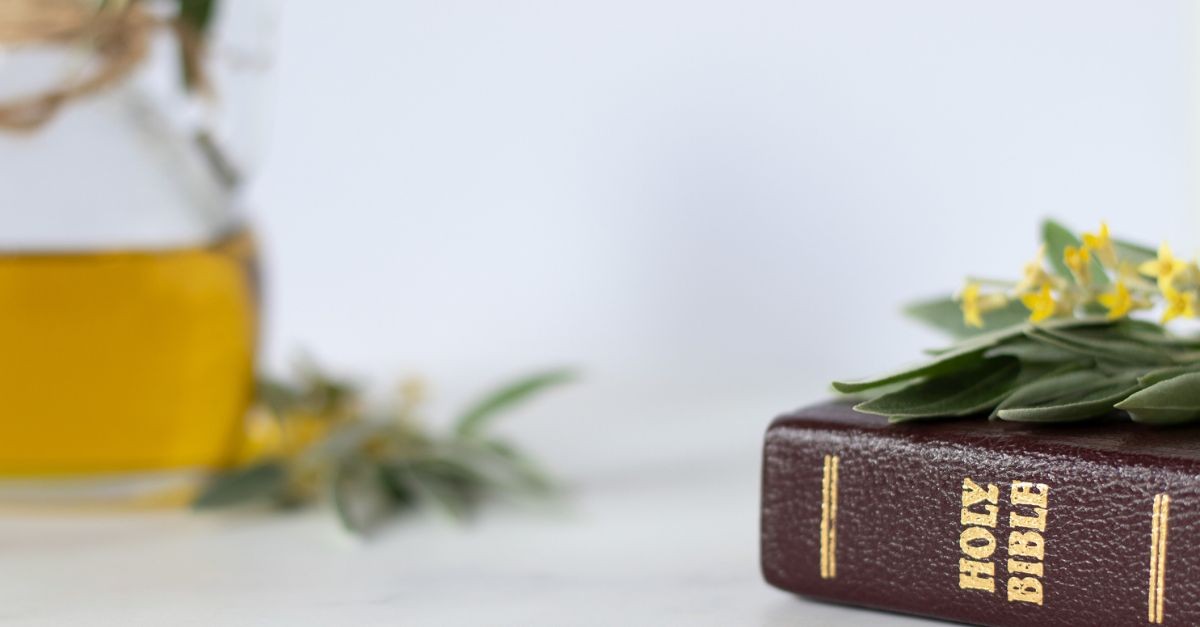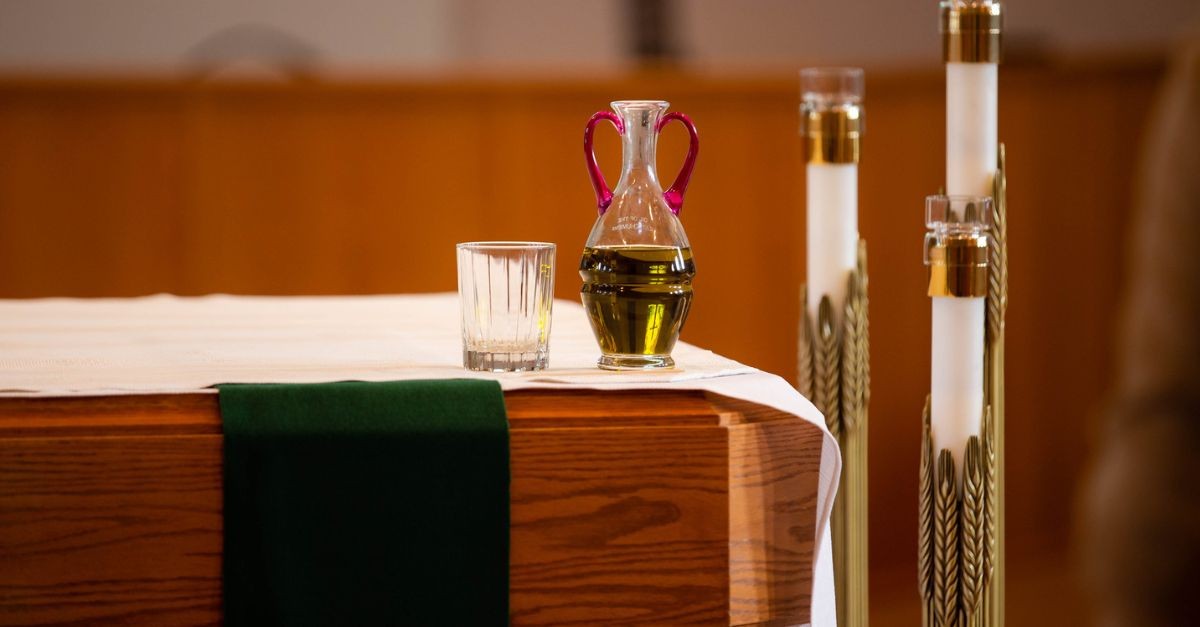
Anointing oil has a long biblical history, from the Old Testament to the New.
Other ancient cultures' oils in religious and royal traditions. Egyptians used oils in religious ceremonies and the embalming process, signifying purification and protection in the afterlife. Ancient Mesopotamians commonly used oil in royal anointing and priestly duties, symbolizing favor and the gods’ blessing. In ancient Greece, athletes used oil before competitions, believing it enhanced their physical prowess and provided a connection to the gods.
The Israelites also took this common practice and adapted it to express the truth about God and their relationship with him. Essentially, oil represented the work of the Holy Spirit. While a simple yet expensive substance, the Bible teaches us important insights about the various works of the Spirit in our lives today.
Here are 7 things you need to know about the significance of anointing oil.
Photo Credit: ©Getty Images/ Marinela Malcheva

1. Affirming Royalty
In the Old Testament, people used anointing oil as a significant symbol for consecrating individuals to royal and sacred offices. Kings were anointed with oil as a sign of God’s appointment and blessing, marking them as chosen leaders. For instance, Samuel anointed Saul and later David as kings of Israel, using oil to signify their divine selection and empowerment by God to rule the nation. More than ritual, the anointing powerfully symbolized the Holy Spirit’s presence, guidance, and protection over the anointed individual. It set them apart for a special purpose, emphasizing their role as God’s representatives on earth.
This practice foreshadowed the anointing of Jesus by the Holy Spirit at his baptism. When John baptized Jesus in the Jordan River, the Holy Spirit descended upon him like a dove, and a voice from heaven declared,
“This is my beloved Son, in whom I am well pleased.” - Matthew 3:16-17
This event mirrored the Old Testament anointing with oil, both king and priest, but instead of physical oil, Jesus was anointed with the Holy Spirit. This anointing marked the beginning of his public ministry and revealed him as the Messiah, the ultimate King, and the fulfillment of the prophecies of a Savior.
As seen in Acts 2 at Pentecost, believers have been anointed by the Holy Spirit to follow and do God’s works, to take the Messiah’s Gospel to the ends of the earth.
Photo Credit: ©Getty Images/Vasil Dimitrov

2. Consecration and Sanctification
Anointing oil holds deep spiritual significance in consecration and sanctification within the Christian faith. We see sanctification in Exodus 30:29, where God instructs Moses regarding the use of anointing oil:
“You shall consecrate them so they will be most holy, and whatever touches them will be holy.”
Anointing oil sets people and objects apart for God’s holy purposes, symbolizing their dedication to his purposes. The act of anointing with oil signifies a spiritual transformation, a transition from common to sacred, from ordinary to holy. When priests, kings, or sacred objects were anointed in the Bible, it signified their special status and divine approval. Obeying the tradition invoked God’s presence and power to sanctify and empower the person or thing for divine roles.
Anointing oil serves as a physical representation of God’s sanctifying work. For example, in Leviticus 8:10-12, Moses anoints Aaron and his sons, consecrating them as priests: “Then Moses took the anointing oil and anointed the tabernacle and everything in it, and so consecrated them. He sprinkled some of the oil on the altar seven times, anointing the altar and all its utensils and the basin with its stand, to consecrate them.”
For Christians today, the Holy Spirit sets us apart to be used by God. Not by our own power or ability, the Spirit separates us from the things of the world for a special purpose. In this sanctification, we are priests.
Photo Credit: ©Getty Images/Alicia Fdez

3. Priestly Role
Anointing oil set people apart to serve as priests in the Old Testament. In Exodus 30:30, where God commands Moses,
“Anoint Aaron and his sons and consecrate them so they may serve me as priests.”
The oil symbolized their dedication and divine appointment. This passage highlights how anointing oil is used to set apart and sanctify individuals for priestly duties, symbolizing their dedication and divine appointment. The act of anointing with oil in the priesthood signifies a special consecration. It marks the individual as chosen by God for sacred service, indicating their role in mediating between God and his people. Anointing oil represents the presence and power of the Holy Spirit, essential for those serving in a priestly capacity. It signifies that the anointed individuals are not acting on their own strength but are endowed with divine authority and guidance.
Jesus is now the High Priest, serving as the ultimate mediator between God and humanity (Hebrews 4:14-15). Through his sacrificial death and resurrection, he entered the heavenly sanctuary, offering himself once and for all. As High Priest, he intercedes for believers, ensuring their access to God's grace and mercy.
With his Spirit within us, we join Christ in this intercession and priestly role. Believers become a “kingdom of priests.” 1 Peter 2:9 calls believers a “royal priesthood,” chosen to declare God’s praises and represent him on earth. Our priestly identity means every believer has direct access to God and is called to live a life of holiness, service, and witness.
Photo Credit: ©Getty Images/VASYL MYKHAILENKO

4. Healing
Anointing oil symbolizes healing for Christians. James 5:14-15 demonstrates this:
“Is anyone among you sick? Let them call the elders of the church to pray over them and anoint them with oil in the name of the Lord. And the prayer offered in faith will make the sick person well; the Lord will raise them up.”
As a royal priesthood, the church elders can use the anointing oil in prayers of healing and God’s restoration. The anointing act signifies the believer’s faith in God's ability to heal and restore. The oil itself does not possess magical properties but serves as a tangible representation of the Holy Spirit’s presence and power. When used in conjunction with prayer, it acts as a faith-filled gesture, inviting God’s intervention and miraculous healing.
Anointing oil reveals the holistic nature of God’s care, addressing physical, emotional, and spiritual well-being. By anointing the sick, believers acknowledge God’s sovereignty over all aspects of life and his desire to bring wholeness and peace. This act of faith creates a connection between the physical action of anointing and the spiritual belief in God’s healing power.
Many churches and congregations continue this practice today, providing comfort and hope to those who suffer and embodying Jesus’ healing ministry, seen clearly in the Gospels. The oil communicates how we have the same Spirit active among us now.
Photo Credit: ©Getty Images/Marinela Malcheva

5. Joy and Gladness
Anointing oil expresses joy and gladness, beautifully illustrated in Psalm 45:7:
“You love righteousness and hate wickedness; therefore God, your God, has set you above your companions by anointing you with the oil of joy.”
Oil symbolizes the infusion of divine joy and gladness into our lives. Reflecting on the Holy Spirit’s work, oil signifies a divine blessing, bringing inner peace and contentment. In ancient times, oil was often used during celebrations and special occasions, marking moments of festivity and joy. The anointing of individuals with oil was a way to express God’s favor and the joy that comes from living in his presence.
Anointing with oil for joy and gladness also expresses the transformative power of the Holy Spirit. The oil represents the Spirit’s ability to uplift and renew our soul, bringing a sense of peace that transcends earthly circumstances. This divine joy is not dependent on external factors but is a deep, abiding sense of contentment that comes from a close relationship with God.
In the context of worship and daily life, anointing with oil can serve as a reminder of the joy that God imparts to his followers. It encourages us to embrace a spirit of gladness, even in challenging times, by focusing on God’s love and promises. God’s joy then flows into praise and worship alone and with our faith community.
Photo Credit: ©Getty Images/marina_mikhaylova

6. Empowerment
Anointing oil teaches us about how the Holy Spirit empowers us. In 1 Samuel 6:13, we read, “So Samuel took the horn of oil and anointed him in the presence of his brothers, and from that day on the Spirit of the Lord came powerfully upon David.” The oil specifically connects to infusing David with divine power and authority by the Spirit.
Anointing with oil empowers individuals for specific roles or tasks ordained by God. In the case of David, the anointing marked his divine selection as king and the beginning of his journey under God’s powerful guidance. This act of anointing was not just a ceremonial gesture but a transformative moment where the Holy Spirit endowed David with the strength, wisdom, and authority needed to fulfill his calling.
In Acts 2, the Holy Spirit empowered the disciples for ministry by filling them with divine power during Pentecost. As the Spirit descended, they began speaking in various languages, enabling them to proclaim the gospel to people from different nations. This event marked the beginning of their bold witness, leading to the conversion of thousands. The Holy Spirit’s empowerment transformed the disciples, equipping them with the courage, wisdom, and ability to spread the message of Jesus worldwide.
The Holy Spirit still empowers us with his presence and ability. This teaches us we don’t rely upon our own abilities but on God’s power given to us through the Spirit. We need divine empowerment to obey God and carry out his work, whether it be leadership, ministry, or any other service.
Photo Credit: ©Pexels/kurt lichtmann

7. Unity
The anointing oil also connects to unity among believers, as highlighted in Psalm 133:1-2: “How good and pleasant it is when God’s people live together in unity! It is like precious oil poured on the head, running down on the beard, running down on Aaron’s beard, down on the collar of his robe.” Oil symbolizes the harmony and togetherness that should characterize the church, both local and universal.
The imagery of oil running down Aaron’s beard and robe expresses the pervasive and all-encompassing nature of unity. Just as the anointing oil covers and consecrates, unity among believers permeates and sanctifies the entire community, fostering a spirit of cooperation and mutual support. This symbolism reinforces the idea that unity is not only desirable but also divinely ordained and blessed.
The New Testament calls Christians to pursue unity as a reflection of their shared faith in Christ. In Ephesians 4:3, Paul urges us and all believers to
“Make every effort to keep the unity of the Spirit through the bond of peace.”
As the oil represents the Spirit, God calls us to the unity of the Spirit. Our unity is grounded in the one body, one Spirit, one Lord, one faith, and one baptism we all share. Jesus also prayed for his followers to be one, just as he and the Father are one (John 17:21). He accomplished this unity within himself, ending all enmity and division (Ephesians 2:14-16), and through the Spirit, we can cling to Christ and answer the call to unity.
Photo Credit: ©GettyImages/vadimguzhva

Originally published Thursday, 15 August 2024.
